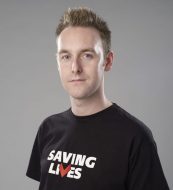
The Saving Lives charity has welcomed the latest HIV data from Public Health England and is calling for a renewed focus on tackling both late diagnoses and undiagnosed populations outside London.
On the 16th January 2020 Public Health England released its annual ‘HIV in the United Kingdom‘ report. The report made for compelling reading, and the key message? HIV infections are going down.
The data showed that one group, gay and bisexual men (GBM) in London, saw new infections decrease by as much of 71% from 2012 to 2018. The story isn’t the same across the board however, at risk populations, especially those outside the capital, are being left behind.
The situation in Birmingham
Saving Lives talked to HIV specialists at the Birmingham Heartlands HIV Service. Worryingly they have seen what appears to be a recent spike in new infections. They note in the last two months that 10 out of the last 16 new diagnoses have been in white British heterosexual men between the ages of 30 and 60. More worryingly 6 of the 10 were diagnosed at a late, or very late stage of infection, and presented to hospital with very common medical conditions.
In fact for the first time in years heterosexual sexual contact is now the primary method of HIV transmission in the Midlands (53% vs GBM 39%), with those in ethnic minorities much more likely to be diagnosed at a late stage which means that person has a tenfold risk of death in the first year compared to someone who was diagnosed early.
Regions around the UK, including Birmingham and Glasgow, have also seen increases in HIV infections in people who inject drugs.
Saving Lives’ Clinical Director, Doctor Steve Taylor, commented:
“This is exactly why we can’t be complacent about HIV testing and need to widen our testing net. We need to make HIV testing as routine and simple as possible. We all need to expand our testing efforts to those groups not classically considered to be at risk of HIV.
“If a person goes into an A&E department in a major city and has bloods taken then those bloods should be automatically also be tested for HIV, as well as Hepatitis B and C.
“We have excellent treatment available for all of these infections, we simply cant afford to miss making these life saving diagnoses.”
Recommendations to achieve better health for all
The Saving Lives charity calls for both renewed focus and investment in 2020 to tackle the number of undiagnosed cases and late diagnoses in people living with HIV outside London and in minority groups. To achieve this goal we need to work together, across the health and charity sectors.
Our recommendations include:
- Full commissioning of pre-exposure prophylaxis (PrEP) by NHS England for those who feel they are risk of HIV acquisition.
- Re-investment in our sexual health and GUM services.
- Improved access to post-exposure prophylaxis (PEP) out of hours at A&E departments.
- Opt-out HIV testing in all A&E departments.
- HIV self-testing and self-sampling schemes designed and led by the communities they’re aimed for.
- Comprehensive and age appropriate Sex & Relationships Education (SRE) in all schools that covers HIV, LGBT+ and consent.
- Harm reduction schemes for people who inject drugs (PWID), including clean needle exchanges, safe injecting spaces, and substitution therapy.
- The decriminalisation of sex work, allowing both sex workers and people who pay for sex to be able to come forward for support and healthcare without fear of legal repercussions.

Tom Hayes, Saving Lives Trustee
Tom Hayes, a Saving Lives trustee, said:
“In 2020 we have the skills, the knowledge, the tests, the tools and the treatments to ensure that no-one need die of HIV, Hep B or Hep C, we’re entering a new decade with everything we need to end the epidemic.
“Unfortunately we’ve still got a long way to go to tackle the stigma that surrounds HIV and its transmission methods. That stigma is what’s standing between us ending new HIV infections by 2030. We need to be having better conversations about HIV and sexual health – be those conversations at school, on the street, in church or at the clinic.
“I’m proud the progress that my home city of Birmingham has made on tackling HIV infections, but it’s clear that there’s much more work to be done, and we can’t do it alone”.


